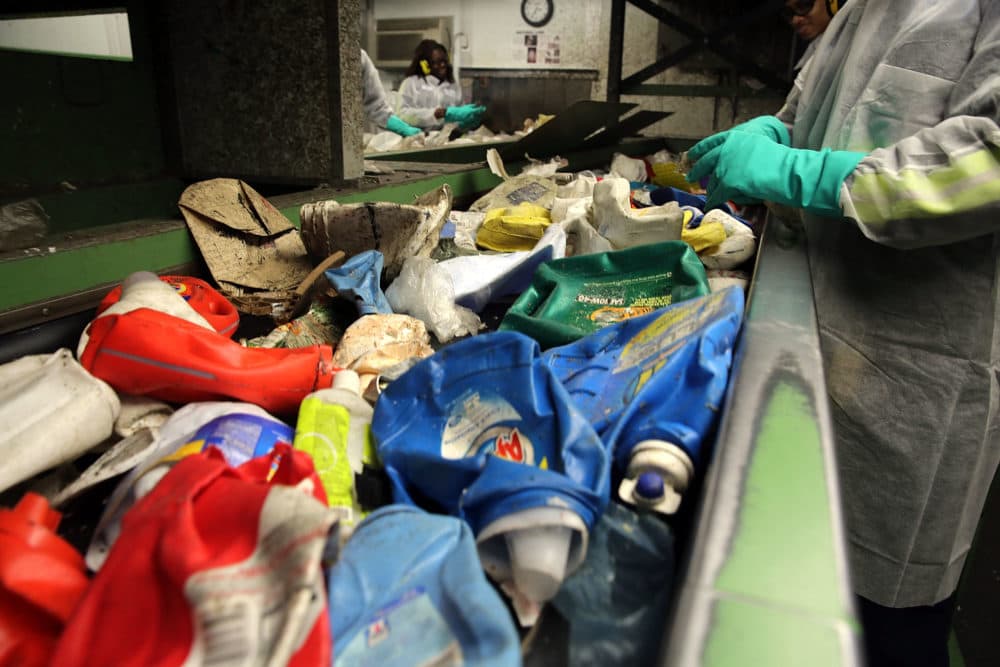Advertisement
Hundreds Of Environmental Groups Call For 'Presidential Plastics Action Plan'

A coalition of more than 500 environmental groups issued a call to action Tuesday to members of President-elect Joe Biden’s transition team. The group has come up with eight steps they say the incoming president can take to reduce plastic pollution without congressional approval.
Americans produce more plastic waste then any other people on the planet — per capita, more than 230 pounds a year. Globally, three-quarters is dumped in landfills where it can take five centuries to decompose, and only a small fraction is actually recycled. The rest ends up in the ocean and inside our bodies.
The Biden administration can play a direct role in decreasing plastic pollution by simply purchasing less plastic, says Judith Enck, a former regional administrator for the Environmental Protection Agency and president of the advocacy group Beyond Plastics.
“The federal government is the single-largest purchaser of goods and services in the country. ... We spend $450 billion on products and services every year,” she says. “So we're looking for the federal government to use its immense purchasing power to drive down plastic pollution.”
Just as the Clinton administration spurred the market for recycled paper by urging federal agencies to buy it wherever possible, the Biden White House could reduce plastic waste by pledging not to purchase as much single-use plastic, she says.
The environmental coalition is also recommending restrictions on permits for new or expanded plastic production facilities connected to fracking sites, which are often located in low-income communities of color. There are about 300 planned projects for new or expanded plastic production sites across the country, Enck says.
Plastics, which were historically made from oil and toxic chemicals, are now created from ethane — a byproduct of fracking — and chemicals, she says. In turn, this has sparked an “enormous increase” in using fracking byproducts to create cheaper plastics.
“One reason this is happening is because the demand for fossil fuel is reducing, because people are shifting to renewable energy sources,” Enck says. “So fossil fuel companies and chemical companies look at plastic production as their plan B to keep their market profitable at the expense of people living in these communities.”
Advertisement
Ethane is instrumental in producing single-use plastics, such as plastic bags and food wrappers, that end up on the street or in the ocean, Enck says. Many businesses use single-use plastic because they are inexpensive, and producing them from ethane will only make them cheaper.
The group is also taking a stand against chemical recycling, which uses chemicals to break down plastics for reuse. Enck says chemical recycling just doesn’t work, even though it is seen as a path forward. Nine states allow chemical recycling facilities to be regulated as manufacturers rather than solid waste operations.
“The concept is that you're going to mix all plastic waste together, heat it, melt it and use it for a new plastic product,” she says. “It's more of a press release than an actual solution to the problem of plastic production. These facilities have failed all over the world.”
Enck says the push for chemical recycling doesn’t get to the root of the problem: cutting down the amount of plastic produced.
In fact, the majority of the plastic that has ever been produced is not recyclable — about 79% of it “has actually ended up in landfills or scattered around the world or burned, but not refashioned into new products,” Sharon Lerner of The Intercept told Here & Now last year.
The increase in medical waste, brought on by the global need for personal protective equipment during the COVID-19 pandemic, is another issue that “poses unique problems,” Enck says.
“I think hospitals need to look at reusable products whenever they can,” she says. “Hospitals used to have large commercial laundry operations where gowns and masks could be laundered and reused, and then you don't run the risk of running out of this material.”
People are also ordering takeout more during the pandemic, and throwing out those single-use plastic containers. Beyond Plastics is encouraging food delivery apps not to include utensils, napkins and condiments in orders unless the customer specifically asks for them, Enck says.
But she says it’s going to take innovative ideas from state and local governments to motivate businesses to shift away from cheap, single-use plastics. For example, New York State recently imposed a strict ban on polystyrene foam in food packaging.
“I think the solution is local and state laws that prohibit the use of some of the worst offenders,” she says. “We need to see a real shift to a reuse economy that ultimately will save businesses money because they won't have to purchase all of the single-use plastic packaging over and over again.”
Lynn Menegon produced and edited this interview for broadcast with Tinku Ray. Samantha Raphelson adapted it for the web.
This segment aired on December 8, 2020.

